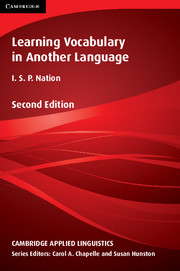Book contents
- Frontmatter
- Contents
- Series editors' preface
- Acknowledgements
- Introduction
- 1 The goals of vocabulary learning
- 2 Knowing a word
- 3 Teaching and explaining vocabulary
- 4 Vocabulary and listening and speaking
- 5 Vocabulary and reading and writing
- 6 Specialised uses of vocabulary
- 7 Vocabulary-learning strategies
- 8 Learning words from context
- 9 Word parts
- 10 Using dictionaries
- 11 Deliberate learning from word cards
- 12 Finding and learning multiword units
- 13 Testing vocabulary knowledge and use
- 14 Designing the vocabulary component of a language course
- Appendices
- Subject index
- Author index
- Frontmatter
- Contents
- Series editors' preface
- Acknowledgements
- Introduction
- 1 The goals of vocabulary learning
- 2 Knowing a word
- 3 Teaching and explaining vocabulary
- 4 Vocabulary and listening and speaking
- 5 Vocabulary and reading and writing
- 6 Specialised uses of vocabulary
- 7 Vocabulary-learning strategies
- 8 Learning words from context
- 9 Word parts
- 10 Using dictionaries
- 11 Deliberate learning from word cards
- 12 Finding and learning multiword units
- 13 Testing vocabulary knowledge and use
- 14 Designing the vocabulary component of a language course
- Appendices
- Subject index
- Author index
Summary
Words are not isolated units of the language, but fit into many related systems and levels. Because of this, there are many things to know about any particular word and there are many degrees of knowing. One of the major ideas explored in this chapter is the relationship and boundaries between learning individual items and learning systems of knowledge. For example, it is possible to learn to recognise the form of a word simply by memorising its form. It is also possible to learn to recognise the form of a regularly spelled word by learning the systematic sound–spelling correspondences involved in the language. Recognition of the word then involves the application of some of the spelling rules. The relationship between item knowledge and system knowledge is complex and there has been enormous debate about certain aspects of it, for example, as it affects young native speakers of English learning to read. For each of the aspects of what it means to know a word, we will look at the item–system possibilities. A second major idea explored in this chapter is what some see as the receptive–productive scale of knowledge and how it applies to each aspect of vocabulary knowledge.
The aims of this chapter are to examine what could be known about a word, to evaluate the relative importance of the various kinds of knowledge, to see how they are related to each other, and to broadly suggest how learners might gain this knowledge.
- Type
- Chapter
- Information
- Learning Vocabulary in Another Language , pp. 44 - 91Publisher: Cambridge University PressPrint publication year: 2013

